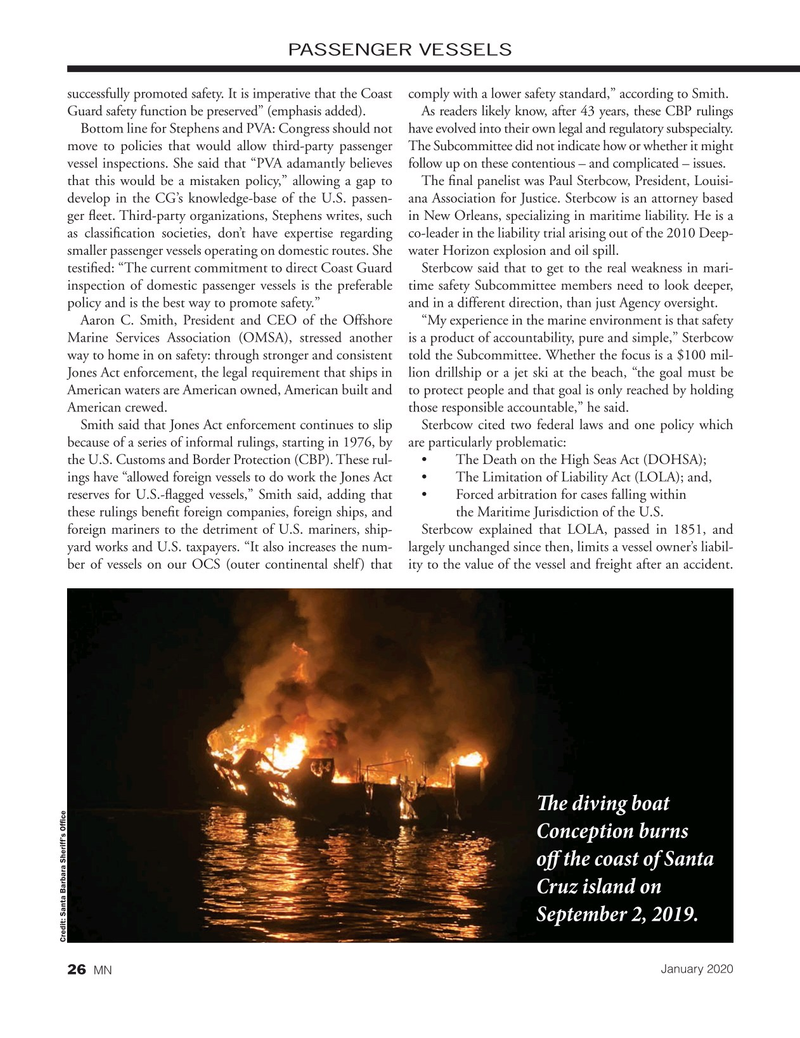
Page 26: of Marine News Magazine (January 2020)
Passenger Vessels & Ferries
Read this page in Pdf, Flash or Html5 edition of January 2020 Marine News Magazine
PASSENGER VESSELS successfully promoted safety. It is imperative that the Coast comply with a lower safety standard,” according to Smith.
Guard safety function be preserved” (emphasis added). As readers likely know, after 43 years, these CBP rulings
Bottom line for Stephens and PVA: Congress should not have evolved into their own legal and regulatory subspecialty. move to policies that would allow third-party passenger The Subcommittee did not indicate how or whether it might vessel inspections. She said that “PVA adamantly believes follow up on these contentious – and complicated – issues.
that this would be a mistaken policy,” allowing a gap to The ? nal panelist was Paul Sterbcow, President, Louisi- develop in the CG’s knowledge-base of the U.S. passen- ana Association for Justice. Sterbcow is an attorney based ger ? eet. Third-party organizations, Stephens writes, such in New Orleans, specializing in maritime liability. He is a as classi? cation societies, don’t have expertise regarding co-leader in the liability trial arising out of the 2010 Deep- smaller passenger vessels operating on domestic routes. She water Horizon explosion and oil spill.
testi? ed: “The current commitment to direct Coast Guard Sterbcow said that to get to the real weakness in mari- inspection of domestic passenger vessels is the preferable time safety Subcommittee members need to look deeper, policy and is the best way to promote safety.” and in a different direction, than just Agency oversight.
Aaron C. Smith, President and CEO of the Offshore “My experience in the marine environment is that safety
Marine Services Association (OMSA), stressed another is a product of accountability, pure and simple,” Sterbcow way to home in on safety: through stronger and consistent told the Subcommittee. Whether the focus is a $100 mil-
Jones Act enforcement, the legal requirement that ships in lion drillship or a jet ski at the beach, “the goal must be
American waters are American owned, American built and to protect people and that goal is only reached by holding
American crewed. those responsible accountable,” he said.
Smith said that Jones Act enforcement continues to slip Sterbcow cited two federal laws and one policy which because of a series of informal rulings, starting in 1976, by are particularly problematic: the U.S. Customs and Border Protection (CBP). These rul- • The Death on the High Seas Act (DOHSA); ings have “allowed foreign vessels to do work the Jones Act • The Limitation of Liability Act (LOLA); and, reserves for U.S.-? agged vessels,” Smith said, adding that • Forced arbitration for cases falling within these rulings bene? t foreign companies, foreign ships, and the Maritime Jurisdiction of the U.S.
foreign mariners to the detriment of U.S. mariners, ship- Sterbcow explained that LOLA, passed in 1851, and yard works and U.S. taxpayers. “It also increases the num- largely unchanged since then, limits a vessel owner’s liabil- ber of vessels on our OCS (outer continental shelf) that ity to the value of the vessel and freight after an accident.
T e diving boat
Conception burns of the coast of Santa
Cruz island on
September 2, 2019.
Credit: Santa Barbara Sheriff’s Of? ce
January 2020 26 MN

 25
25

 27
27
